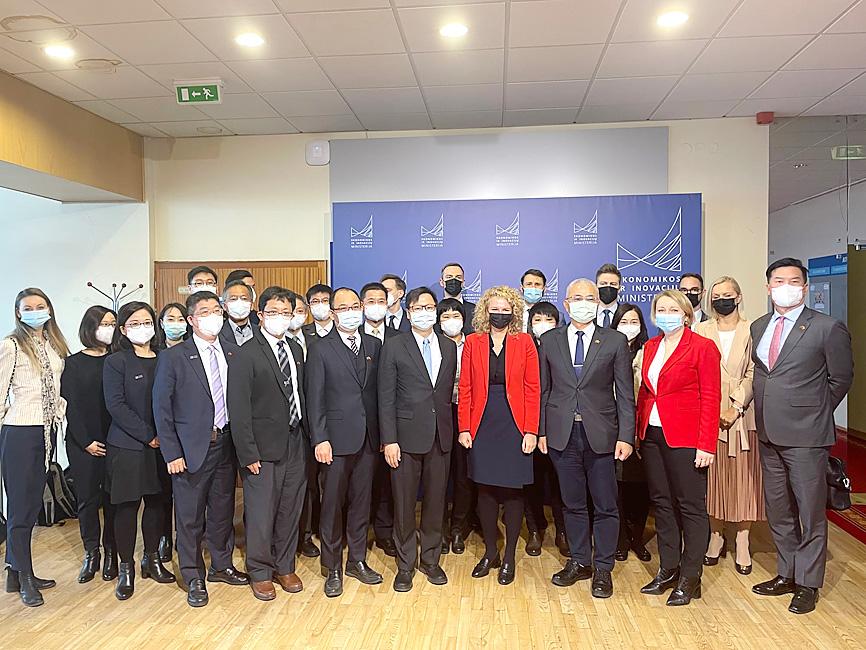Lithuanian Minister of the Economy and Innovation Ausrine Armonaite yesterday recommended jointly establishing a semiconductor fabrication facility as she welcomed a Taiwanese trade delegation.
Lithuania has the technological capability and know-how to develop a semiconductor industry, but it is important that Lithuania learn from Taiwan’s experiences in the sector, Armonaite said.
Taipei and Vilnius last month collaborated on establishing the Taiwan and Lithuania Center for Semiconductors and Materials Science, and the next step would be to construct a fabrication facility, Armonaite said.

Photo: Screen grab from Facebook
“We are in the process of assessing investment opportunities for Taiwan Semiconductor Manufacturing Co (台積電), United Microelectronics Corp (聯電) and other firms,” she added.
Representative to Lithuania Eric Huang (黃鈞耀) told reporters that the two nations are still exploring different models of collaboration, but Taiwan is sincere in pursuing industrial and academic collaborations with Lithuania.
Taiwan and Lithuania have been steadily increasing collaboration.
In January, Taiwan unveiled the Taiwanese Investment Foundation for Middle and Eastern Europe, which would have access to US$200 million.
The government also created a foundation with access to US$1 billion to help in financing collaborations between Taiwan and Lithuania.
The delegation is to visit Lithuania, the Czech Republic and Slovakia, after a Taiwanese delegation visited the same countries in October last year, led by National Development Council Minister Kung Ming-hsin (龔明鑫).
The delegation is to tour the Lithuanian Center for Physical Sciences and Technology — under which the Taiwan and Lithuania Center for Semiconductors and Materials was founded — local universities and the Santaka Valley, the council said.
The Santaka Valley is an association uniting and integrating the activities of research, technology and academic institutions in Kaunas, Lithuania.
The delegation is to meet with industry representatives in the laser technology, Internet of Things and manufacturing sectors, the council said, adding that the delegation would also be interacting with Lithuanian senators.

WAITING GAME: The US has so far only offered a ‘best rate tariff,’ which officials assume is about 15 percent, the same as Japan, a person familiar with the matter said Taiwan and the US have completed “technical consultations” regarding tariffs and a finalized rate is expected to be released soon, Executive Yuan spokeswoman Michelle Lee (李慧芝) told a news conference yesterday, as a 90-day pause on US President Donald Trump’s “reciprocal” tariffs is set to expire today. The two countries have reached a “certain degree of consensus” on issues such as tariffs, nontariff trade barriers, trade facilitation, supply chain resilience and economic security, Lee said. They also discussed opportunities for cooperation, investment and procurement, she said. A joint statement is still being negotiated and would be released once the US government has made

NEW GEAR: On top of the new Tien Kung IV air defense missiles, the military is expected to place orders for a new combat vehicle next year for delivery in 2028 Mass production of Tien Kung IV (Sky Bow IV) missiles is expected to start next year, with plans to order 122 pods, the Ministry of National Defense’s (MND) latest list of regulated military material showed. The document said that the armed forces would obtain 46 pods of the air defense missiles next year and 76 pods the year after that. The Tien Kung IV is designed to intercept cruise missiles and ballistic missiles to an altitude of 70km, compared with the 60km maximum altitude achieved by the Missile Segment Enhancement variant of PAC-3 systems. A defense source said yesterday that the number of

‘CRUDE’: The potential countermeasure is in response to South Africa renaming Taiwan’s representative offices and the insistence that it move out of Pretoria Taiwan is considering banning exports of semiconductors to South Africa after the latter unilaterally downgraded and changed the names of Taiwan’s two representative offices, the Ministry of Foreign Affairs (MOFA) said yesterday. On Monday last week, the South African Department of International Relations and Cooperation unilaterally released a statement saying that, as of April 1, the Taipei Liaison Offices in Pretoria and Cape Town had been renamed the “Taipei Commercial Office in Johannesburg” and the “Taipei Commercial Office in Cape Town.” Citing UN General Assembly Resolution 2758, it said that South Africa “recognizes the People’s Republic of China (PRC) as the sole

Taiwanese exports to the US are to be subject to a 20 percent tariff starting on Thursday next week, according to an executive order signed by US President Donald Trump yesterday. The 20 percent levy was the same as the tariffs imposed on Vietnam, Sri Lanka and Bangladesh by Trump. It was higher than the tariffs imposed on Japan, South Korea and the EU (15 percent), as well as those on the Philippines (19 percent). A Taiwan official with knowledge of the matter said it is a "phased" tariff rate, and negotiations would continue. "Once negotiations conclude, Taiwan will obtain a better